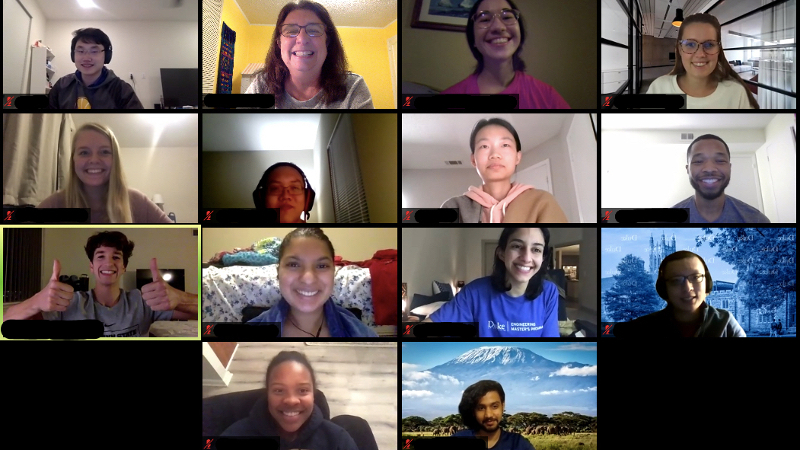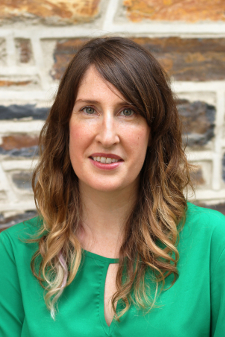Cohort Community Initiative Builds Connections for Pratt Master’s Students
By Angus Bowers
Unable to connect to Duke in person, master’s students find connections and commonality through the Cohort Community Initiative

It is an understatement to say that the COVID-19 pandemic has had a profound impact on universities around the world this year. Like so many other graduate programs in the United States and elsewhere, the Engineering Master’s Program at Duke’s Pratt School of Engineering, which welcomes students from over 15 countries, was faced with a heavy challenge as the start of the Fall 2020 semester loomed. What steps could they take to create a sense of community for incoming students who would not physically be in the same location—or even the same time zone?
This dilemma is not one that Pratt took lightly. Their Engineering Master’s Programs are intense and challenging, as students have a short amount of time to master difficult coursework, perform group project work, and build strong networks with their peers and professors. Due to the intensity of the programs, there is always a strong sense of cohort-building for any given incoming class that occurs organically.
Without these organic opportunities, questions for the program loomed. How could the Engineering Master’s Program attempt to approximate that experience to help these students—who have far less time than either undergraduates or doctoral students—to build a community of support among their peers, and with Pratt’s staff and faculty, to make sure they could move swiftly to ensure their success? That’s where Pratt’s CCI classes come in.
CCI stands for Cohort Community Initiative. Incoming master’s students were automatically registered in this course, in most cases with other students from their program track. Careful thought was put into the design of the course, including curriculum, class size and frequency of meetings to help meet student needs as effectively as possible.
 “The intent of the course was to offer a combination of services including communications support; intercultural navigation support; career development; resource alignment; diversity, equity, and inclusion learning opportunities; and a community to engage with regularly,” said Bridget Fletcher, director of Graduate Communications and Intercultural Programs and originator of the CCI course.
“The intent of the course was to offer a combination of services including communications support; intercultural navigation support; career development; resource alignment; diversity, equity, and inclusion learning opportunities; and a community to engage with regularly,” said Bridget Fletcher, director of Graduate Communications and Intercultural Programs and originator of the CCI course.
Although many of the master’s students come from outside the United States, the classes included all students to help integrate everyone, international or domestic, into the Pratt community.
In the first week of classes, students were given the opportunity to name their own cohort. This involved introducing a group of roughly 15 strangers and inspiring them to work on a group identity project. The result was a cadre of representative and creative names, such as The Logistical Enigmas (a class formed by students whose schedule fit nowhere else), Starry Night Squad, The X-MEM (Master of Engineering Management), CEE’s Get Degrees (Civil and Environmental Engineering), and InFINity (Financial Technology). Through this initial activity, groups began to think of themselves as a cohort by showing familiarity and cohesion.
From there out, the CCI course unfolded with a schedule of topics covered in a weekly meeting, which allowed students to learn more about making the most of remote learning, accessing library services and interacting virtually with faculty. These meetings also covered a range of professional skills useful for graduate school and career planning, such as communicating more clearly, better understanding their own attributes and learning how to negotiate for themselves.
Pratt’s administrators responded to the CCI model and its deployment in a positive way. Leaders there were concerned that student experience in this remote setting not be diminished in any aspect in comparison to any other year. As student feedback started to roll in, the administration was excited to hear that the response from students was also positive.
Not only did administrators want to create an environment where students could learn and perform their best, they also wanted students to feel satisfaction in knowing they made the right choice to embark on an engineering degree at Duke. In addition to the topics covered, there were also visits by director of master’s studies and/or master’s coordinators from various departments. This helped provide a forum for the cohorts to interact with the people running their program and to forge relationships with them so that they felt less trepidation in asking questions.
“Being that we are operating virtually this semester, having time to meet with classmates outside of academic work was a nice addition to each week.”
Of noteworthy interest, the course also helped students focus on how to develop themselves, both academically and personally. In addition to tips on time management and keeping themselves organized, students were also introduced to the benefits of meditation and how to use their own parasympathetic nervous system response to shut down anxiety. Additionally, students were introduced to the various supports Duke University has in place to help students maintain good mental health in this time of uncertainty and isolation.
Both the creator and facilitators of the course said that one of the best aspects of the course was the regular exchange of emails with students. This component was designed to be the only real homework required. Facilitators sent an email prompt to their sections, and students had to respond either by using text or an image to sum up their reaction or situation. In many of these exchanges, students who were loath to speak up in class would open up about academic and non-academic concerns alike.
“This interaction was much like the way students often arrive early or stay after class so they can ask a question,” said Fletcher. “This email exchange was an unexpected way for that type of interaction to happen remotely.”
It is worth noting that the CCI creator, facilitators and students all felt this was a very useful interaction that added to the success of the course, giving a private space to address concerns, fears and hopes, which were met with support and guidance.
 When asked about the experience of teaching a CCI course, one instructor, Marcie Pachino said, “It was definitely a success. All first-year master’s students had a common, personalized experience. Our team now knows an entire cohort of students. And each student now has a strong connection to one of us. Students made connections with each other that they otherwise wouldn’t have had a chance to do under the current remote learning set-up.”
When asked about the experience of teaching a CCI course, one instructor, Marcie Pachino said, “It was definitely a success. All first-year master’s students had a common, personalized experience. Our team now knows an entire cohort of students. And each student now has a strong connection to one of us. Students made connections with each other that they otherwise wouldn’t have had a chance to do under the current remote learning set-up.”
The experience was a success. The response from both domestic and international students was largely positive, in spite of the fact that instructors and students alike missed the in-person aspect of classes. Most students were happy to work on professional skills, and the preponderance of participants appreciated the more casual way to relax and de-stress while talking to people in their cohort outside of highly content-focused engineering classes.
One student stated, “Being that we are operating virtually this semester, having time to meet with classmates outside of academic work was a nice addition to each week.” Another added, “It allowed me to spend time with a consistent group of people. In other words, it provided consistency and connection.”
A fear in the mind of those running the cohort community initiative was that students would not want to engage or would not recognize the utility of this course and see it as another box to tick each week, but one student addressed those fears by saying, “I found the course very enjoyable. I was skeptical in the beginning, but I was brought around by it mid-way through.”
This was exactly the desired outcome for the CCI course. “When the world had to move online last spring, things changed drastically,” said Fletcher. “It was disorienting and hard to adjust to this completely different way of working and being. When I thought about how hard it was for me, I started to really think about how hard this would be for students, especially students outside the US. I wanted to create a support system for them that was practical and authentic with a ‘home base’ feel. The cohort model made great sense for all of these reasons and some logistical ones too. It felt like the right way to give the students a core group they could count on and easy access to a staff member that could unlock a lot of the mystery of Duke—a place they would normally be able to explore on their own.”
While everyone in the Pratt community looks forward to being able to return to in-person classes when herd immunity has been achieved, the Cohort Community Initiative has been a dynamic response to the need for connection in what is a very distanced time. In spite of all the challenges of online learning, the incoming class of Engineering Master’s students were immediately welcomed and given a sense of belonging, which is crucial to a successful graduate school experience.
